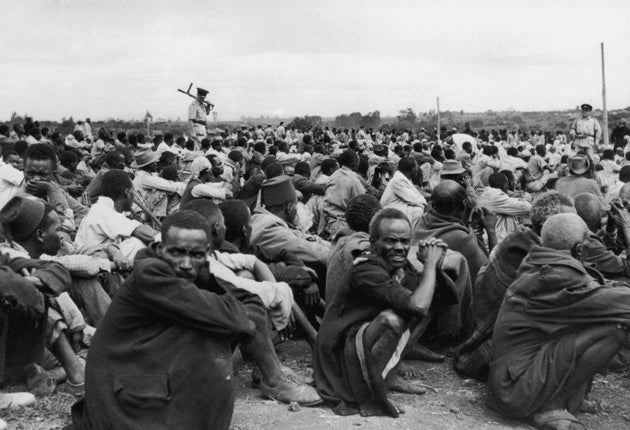Cabinet 'hushed up' torture of Mau Mau rebels

Your support helps us to tell the story
From reproductive rights to climate change to Big Tech, The Independent is on the ground when the story is developing. Whether it's investigating the financials of Elon Musk's pro-Trump PAC or producing our latest documentary, 'The A Word', which shines a light on the American women fighting for reproductive rights, we know how important it is to parse out the facts from the messaging.
At such a critical moment in US history, we need reporters on the ground. Your donation allows us to keep sending journalists to speak to both sides of the story.
The Independent is trusted by Americans across the entire political spectrum. And unlike many other quality news outlets, we choose not to lock Americans out of our reporting and analysis with paywalls. We believe quality journalism should be available to everyone, paid for by those who can afford it.
Your support makes all the difference.Eight British officials accused during a vicious colonial war of having prisoners tortured to death – some were burned alive – went unpunished even after their crimes had been reported to the Cabinet, according to a document submitted to a high court yesterday.
Four elderly Kenyans are seeking redress for their brutal treatment by the British during the suppression of the Mau Mau rebellion in the 1950s. The Foreign Office has not disputed that the four were tortured, but is seeking to have the case struck off as the perpetrators were not working for the UK government but for the colonial administration in Kenya.
To coincide with the case, brought by the London law firm Leigh Day, the Government is releasing more than 1,500 files, containing an estimated 17,000 pages, relating to British rule in Kenya, along with thousands more files from other former colonies. None of these documents has been released yet, but David Anderson, professor of African politics at Oxford University, has been allowed to examine about 300 files, and his written evidence was part of yesterday's hearing.
One of the documents he has seen was a telegram sent on 17 January 1955 by the Governor of Kenya, Evelyn Baring, to the Secretary of State for Colonies, Alan Lennox-Boyd, containing the horrific detail that prisoners had been burned alive.
In others, he found ample evidence that officialdom covered up for British officers and their African subalterns who used "coercive force" against the Mau Mau. In February 1956 a provincial commissioner in Kenya, "Monkey" Johnson, wrote to the Attorney General, Sir Reginald Manningham-Buller, urging him to block any enquiry into the methods used against the Mau Mau, because "it would now appear that each and every one of us, from the Governor downwards, may be in danger of removal from public service by a commission of enquiry as a result of enquiries made by the CID."
Another file showed Governor Baring discussing with Mr Lennox-Boyd the "political difficulties" that could arise from the use of torture. In another, Mr Baring, a member of the banking family, asked his staff to update him on the number of suspects "beaten" in Mwea camp.
Tom Askwith, who was as an Olympic rower in the 1930s, before taking up a career in the colonies, was one of the few Kenyan officials to speak out against the abuses; he was sacked as a result. On a visit to Mwea, he witnessed "food denial with starvation for up to three days, sleep deprivation through water being thrown over detainees, and regular brutal beatings."
Robert Jay, representing the Foreign Office, admitted that two of the men in court yesterday, Ndiku Mutua and Paulo Nzili, were tortured and castrated by the British, and a third, Wambugu Wa Nyingi, was beaten unconscious during the Hola massacre, on 3 March 1959, when 11 prisoners were clubbed to death by the guards. The only woman claimant, Jane Muthoni Mara, was tortured and sexually abused.

Join our commenting forum
Join thought-provoking conversations, follow other Independent readers and see their replies
Comments